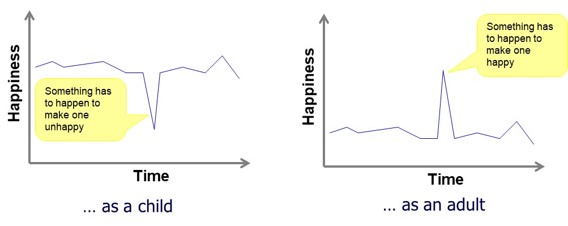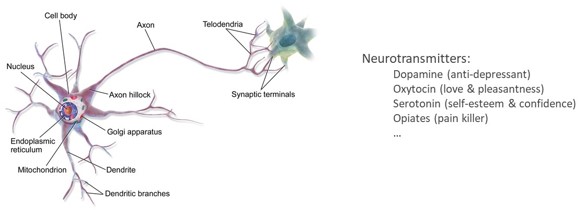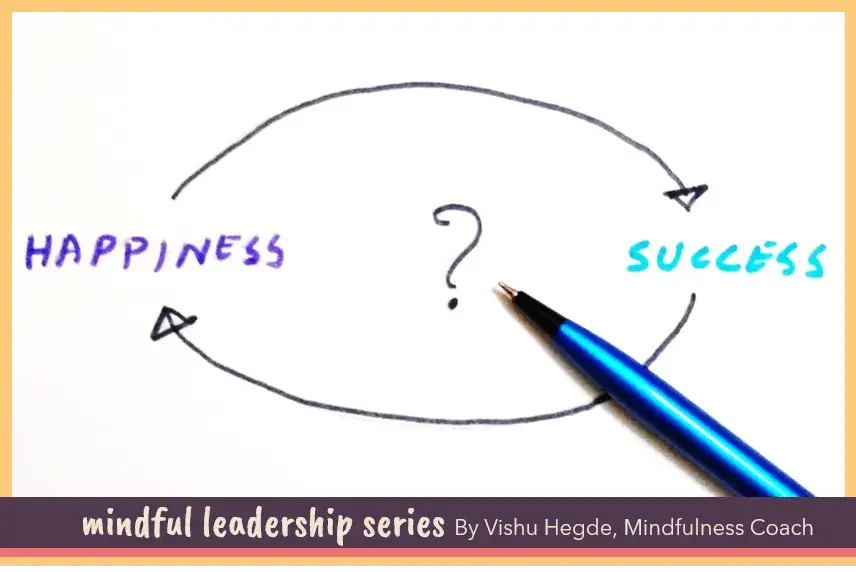Does Success lead to Happiness or Happiness lead to Success? This sounds like a chicken or egg question. When I ask this question during Mindful Leadership sessions, I get both kinds of responses.
Of course, the definition of success and happiness vary from person to person. But in general, we consider Success means rich & famous, having wealth & status. And Happiness means having fun and enjoying life.
Let me ask some more questions to get to the bottom of this question. When are we most effective in whatever we are doing? – is it when we are upset, angry, depressed, …. or when we are happy, joyful? We are most effective when we are in a positive emotion than negative emotion, isn’t it? And when we are effective in whatever we are doing, we become more successful in that. That means happiness is a prerequisite for success. Of course, when success comes, it adds to the happiness.
This sounds like common sense. But, do we live that way? We are constantly chasing success – getting something – money, material, relationship, status, … thinking that if we get that we’ll be happy. Once we get that, the happiness from that is transient; we start looking at getting the next thing. So, we make happiness conditional – if-then-else loop.
I ask the participants to draw their happiness graph for a month or a year and ask them to reflect. Most of the time it’s low and once in a while a spike when they get ‘something’. Then I ask them to reflect on young children and draw their happiness graph. It’s the inverse of that of adults’ graph – most of the time they are joyful and once in a while low when something happens. For adults something has to happen to become happy, for children something has to happen to become unhappy.

Adults were children once upon a time; but then what changed? For this, most participants respond that children don’t have any responsibilities and goals/targets and so on. Actually that’s not the reason. It’s because children are in the present moment most of the time, whereas adults are hardly in the present moment – 90% of the time their thoughts will be either of the past (worry, analysis-paralysis, …) or of the future (planning, fear, ‘what-if’ thoughts …). Adults struggle and take a long time to come out of negative emotions, whereas children bounce back very quickly and start running & playing – their mean-time-to-recovery (MTTR) is very short.
We understood that we are more effective when we are in a state of positive emotions. So, if we have to deal with larger responsibilities and higher goals, we should keep our mind more in a state of pleasantness, isn’t it? That means if we have bigger problems, we should be happier – not because of the problems, but to deal with the problems more effectively.
But how to be happy all the time? – by being in the present moment. How to be in the present moment? – Mindfulness practices have been found very effective in keeping the mind calm, pleasant, less stressed, less reactive and in the present moment.
Another significant impact of Mindfulness practice is it’s transformational impact on the brain, nervous system, endocrine system and hormones which impact our moods, emotions, thinking & feelings. There are umpteen number of neuroscience researches which have demonstrated this impact. For example, Mindfulness practices increase neurotransmitters like Dopamine (anti-depressant) and Oxytocin (happiness hormone) which help us to be in a pleasant and positive state of mind.

This means happiness is a chemistry and we can manufacture it within us unconditionally. At times of adversity, we need an even more balanced and positive state of mind. We can create such conditions by Mindfulness practices.
If we observe, everybody is seeking happiness – they are doing whatever they are doing, to be happy. People gravitate towards and want to be associated with happy people, not people with negative emotions & attitudes. We not only can manufacture happiness within us, but also can export it to others – happiness is highly contagious. When we create value to others, we become successful.
So, BE Happy and Become Successful.
Stay tuned for more in the Mindful Leadership series.
You can download a free eBook on Mindfulness@Work here.
You can practice audio/video guided Mindfulness techniques here.
You can get more info on Mindful Leadership here.
If you are curious & adventurous and want to explore & experiment deeper, watch the following videos in that order:
- Managing Self with Mindfulness@WFH : Managing Self
- Holistic Mindfulness – Body, Mind, Energy Integrated Approach: Holistic Mindfulness
- Beyond Mindfulness – No Mind : Beyond Mindfulness






10 Responses
Great Vishu Sir.
One thing I particularly liked in this article of yours is, I quote, you can export happiness to others.
Thanks. Keep rocking.
Thank you Ranganatham!
Nice article. Happiness or joy comes by doing service. Any service which creates value to others can create happiness. Sometimes senior executives or person is high post in govt organization, becoming bored or sad after getting retired from their services. Here is a story in Kannada about a retired elephant.
ಒಬ್ಬ ರಾಜ.. ಅವನ ಸೇನೆಯಲ್ಲಿ ನೂರಾರು ಕುದುರೆ, ಒಂಟೆ, ಆನೆ, ಕಾಲಾಳುಗಳು.. ರಾಜನಿಗೆ ಒಂದು ಆನೆಯ ಮೇಲೆ ಬಲು ಪ್ರೀತಿ. ಪ್ರತಿ ಯುದ್ಧವೇ ಆಗಲಿ ಮತ್ತೇನೇ ಆಗಲಿ ತಾಳ್ಮೆಯಿಂದ ಶ್ರದ್ಧೆಯಿಂದ ತನ್ನ ಕೆಲಸ ಮಾಡಿಕೊಂಡು ಬರುತ್ತಾ ಇತ್ತು..ಹೀಗೆ ಇರುವಾಗ ಆನೆಗೆ ಕೂಡ ವಯಸ್ಸಾಗ್ತಾ ಬಂತು.. ಕೆಲ್ಸ ಮಾಡೋ ಕ್ಷಮತೆ ಕುಂದಿದಂತೆ ಕಾಣ ತೊಡಗಿತು.
ರಾಜ ಇನ್ನು ಈ ಆನೆಗೆ ತೊಂದರೆ ಕೊಡುವುದು ಬೇಡ ಎಂದು ಅದನ್ನ ಕೆಲಸಕ್ಕೆ ಹಚ್ಚುವುದ ನಿಲ್ಲಿಸಲು ಹೇಳಿದ. ಆನೆ ಮಂಕಾಗತೊಡಗಿತು.. ಒಮ್ಮೆ ನೀರು ಕುಡಿಯಲು ಹೋದ ಆನೆ ಕೆಸರಿನಲ್ಲಿ ಸಿಕ್ಕಿಕೊಂಡು ಬಿಟ್ಟಿತು.. ಎಷ್ಟೇ ಪ್ರಯತ್ನ ಪಟ್ಟರೂ ಹೊರ ಬರಲು ಸಾಧ್ಯವಾಗದೆ ಘಿಳಿಡಲು ತೊಡಗಿತು.. ರಾಜ ಸೈನಿಕರ ಜೊತೆ ಬಂದು ಎಷ್ಟೇ ಪ್ರಯತ್ನ ಪಟ್ಟರೂ ಆನೆ ಕೆಸರಲ್ಲಿ ಹೂತುಕೊಳ್ಳುತ್ತಲೇ ಹೋಯ್ತು .. ರಾಜ ನೊಂದುಕೊಂಡ .. ಮಂತ್ರಿಗಳ ಮುಖ ನೋಡಿದ .. ಒಬ್ಬ ಮಂತ್ರಿ ಸೈನಿಕರ ಕರೆದು ಯುದ್ಧ ಕಹಳೆಯ ದನಿ ಹೊರಡಿಸಲು ಹೇಳಿದ .. ಕಹಳೆಯ ದನಿ ಮೊಳಗಿದಂತೆಲ್ಲಾ ಆನೆ ಕಿವಿ ನಿಮಿಸಿರಿ ಕಣ್ಣರಳಿಸಿ ನೋಡಿ ತನ್ನೆಲ್ಲ ಶಕ್ತಿಯನ್ನು ಹಾಕಿ ಹೊರ ಬಂತು ..ಎಲ್ಲರೂ ಹರ್ಷೋದ್ಘಾರ ಮಾಡಿದರು …
ಮಂತ್ರಿ ಹೇಳಿದ ‘ಶರೀರ ಬಲವೊಂದೇ ಬದುಕಲ್ಲ ಪ್ರಭು, ಬದುಕಲು ಒಳಗಿನಿಂದ ಒಂದು ಸ್ಪೂರ್ತಿ ಬೇಕು.. ನನ್ನ ಅವಶ್ಯಕತೆ ಈ ಜಗತ್ತಿಗಿದೆ ಎಂಬ ಭಾವದ ಪ್ರೇರಣೆ ಬೇಕು…ಆ ಸ್ಪೂರ್ತಿ ಬದುಕಲು ಪ್ರೇರೇಪಿಸಿದಾಗ ಮಾತ್ರ ಬದುಕಲು ಛಲ ಬರುತ್ತದೆ . ಆ ಸ್ಫೂರ್ತಿ ನಮ್ಮ ಮೇಲೆ ನಮ್ಮವರು ಇಟ್ಟಿರುವ ಭರವಸೆ, ಪ್ರೀತಿಗಳಿಂದ ಸಿಗುತ್ತದೆ ….. ‘ಒಂದು ಸಣ್ಣ ಒಳ್ಳೆಯ ಮಾತು,ಸ್ಪರ್ಶ, ನಗು ಬದುಕಿನ ಹಾದಿಯ ಬದಲಿಸಬಲ್ಲುದು…
Very nice story indeed, Shivaram! Thanks for sharing it.
Good. many things are brought out in this article to the context. My thought is, should we inter link those two, happiness and success or look at it separately? Most powerful influence on this is man’s ego and the society(social atmosphere). I see this in two ways : success as defined by self and as defined by others, similarly happiness. If we de-link then probably will have long, sustainable happiness. Even the completion of smallest work (of himself or for others ) in perfection should keep oneself most happy. As on now, all those 4 factors( happiness, success, ego, society) are interlinked.
That is why world is becoming so complex today.
True. Ultimate happiness is beyond ego (identity of self).
Good one to follow. Thanks Vishu. I think it is cyclic.. where we have to be happy to be successful as you rightly said positive mind leads to success… that in turn will lead to happiness and motivates to be happy. Also being present is key… brooding on past will not help the present nor worrying about future helps.
Thanks Indu.
Simply awesome. Always a big fan of your words. The thought of this article itself will bring in some changes in me. Thanks Vishu for sharing.
Thanks Nithya. Glad that you found it of some use.